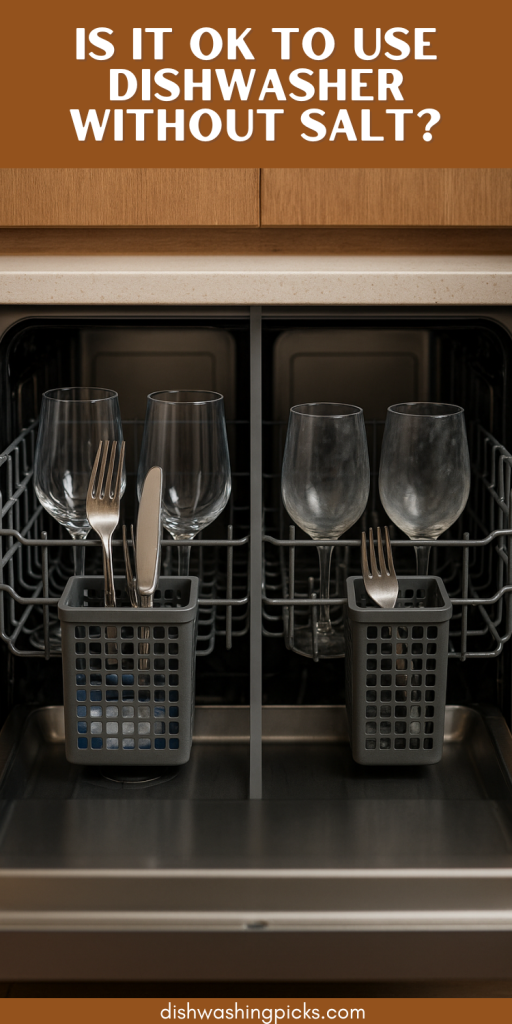
Ever found yourself staring at that blinking salt warning light on your dishwasher, wondering, “Do I really need to add salt, or is this just another overhyped thing?”
You’re not alone.
Dishwasher salt is one of those things that confuses a lot of people. It’s not like regular table salt (so no, don’t sprinkle sea salt in there and hope for the best), and it’s not always required in every home. So… what’s the deal?
Let’s break it down and answer the big question: Can you skip the salt and still get sparkling clean dishes?
What Does Dishwasher Salt Even Do?
Okay, first—what is this magical salt and why does your dishwasher keep asking for it like it’s on a low-sodium diet?
Dishwasher salt is used to soften hard water. If you live in an area where the water has a lot of minerals—think calcium and magnesium—those minerals can build up over time inside your machine. That leads to:
- Cloudy glasses
- Gunky dishwasher parts
- Reduced efficiency
- And potentially some very meh dishwashing results
The salt works with your dishwasher’s built-in water softener unit, helping it regenerate and keep mineral buildup at bay.
So really, it’s not about the dishes. It’s about keeping the machine itself running smoothly.
So… Can You Use Your Dishwasher Without Salt?
Short answer: Yes, but only under certain conditions.
Let’s break it down:
When It’s Probably OK:
- You live in a soft water area (lucky you!)
- Your dishwasher doesn’t have a built-in water softener
- You’re using 3-in-1 or all-in-one tablets that already include salt
In these cases, your dishwasher may not need extra salt—and you won’t see a drop in performance if you skip it.
When It’s Not a Great Idea:
- You live in a hard water region (most cities fall into this category, by the way)
- Your glasses are coming out cloudy or your machine is scaling up
- You’re using basic detergent without built-in softeners
Still not sure about your water type? You can buy a cheap water hardness test strip or even ask your local water supplier. If your water’s on the hard side, you’ll want to keep that salt reservoir filled.
Real-Life Example: The Mystery of the Cloudy Wine Glasses
Let’s say you hosted a dinner party (fancy, right?), and after the cycle, your wine glasses look like they’ve been sneezed on by a ghost. Foggy, filmy, and kind of gross.
You clean them again—no change. You even try vinegar (classic move), but the fog comes back.
Sound familiar?
That’s almost always hard water + no salt in action. The minerals in the water dry onto the surface, leaving that stubborn cloudy layer. Not a great look.
One shake of dishwasher salt in the reservoir later? Bam. Sparkle city.
Do All Dishwashers Need Salt?
Nope—not all of them. Here’s a quick way to check:
- European dishwashers: Nearly all come with a built-in water softener and a salt compartment. These definitely need dishwasher salt unless you have super soft water.
- American dishwashers: Many don’t include a water softener at all, relying instead on your home’s water softening system (if you have one) or those multitasking detergent pods.
So, if your machine has a salt compartment, that’s a good clue it expects you to use it. If it doesn’t—relax. It probably doesn’t need any.
Should You Bother With Dishwasher Salt?
Here’s the real talk:
- If you have hard water and a salt-compatible dishwasher: Yes, absolutely use salt. It protects your machine and your dishes.
- If you have soft water or a machine without a softener unit: You’re fine skipping it—just keep using quality detergent.
- If you’re seeing signs of hard water damage (cloudy dishes, chalky buildup): That’s your dishwasher crying for help. Salt can fix it.
It’s not a gimmick. It’s more like behind-the-scenes maintenance that saves you headaches down the road.
Final Thoughts (and One Small Call to Action)
So, is it OK to use your dishwasher without salt? Sometimes, yes—but only if your setup allows it. Otherwise, it’s like skipping oil changes and hoping your car keeps running forever. Eventually… things break down.
Try this: If you’re unsure, run a test. Use your dishwasher without salt for a week, then check your dishes and machine. Notice any difference? That’s your answer.
And hey, if this article cleared things up (or made you realize your dishwasher deserves more love), maybe go check that salt compartment now. Just sayin’.
